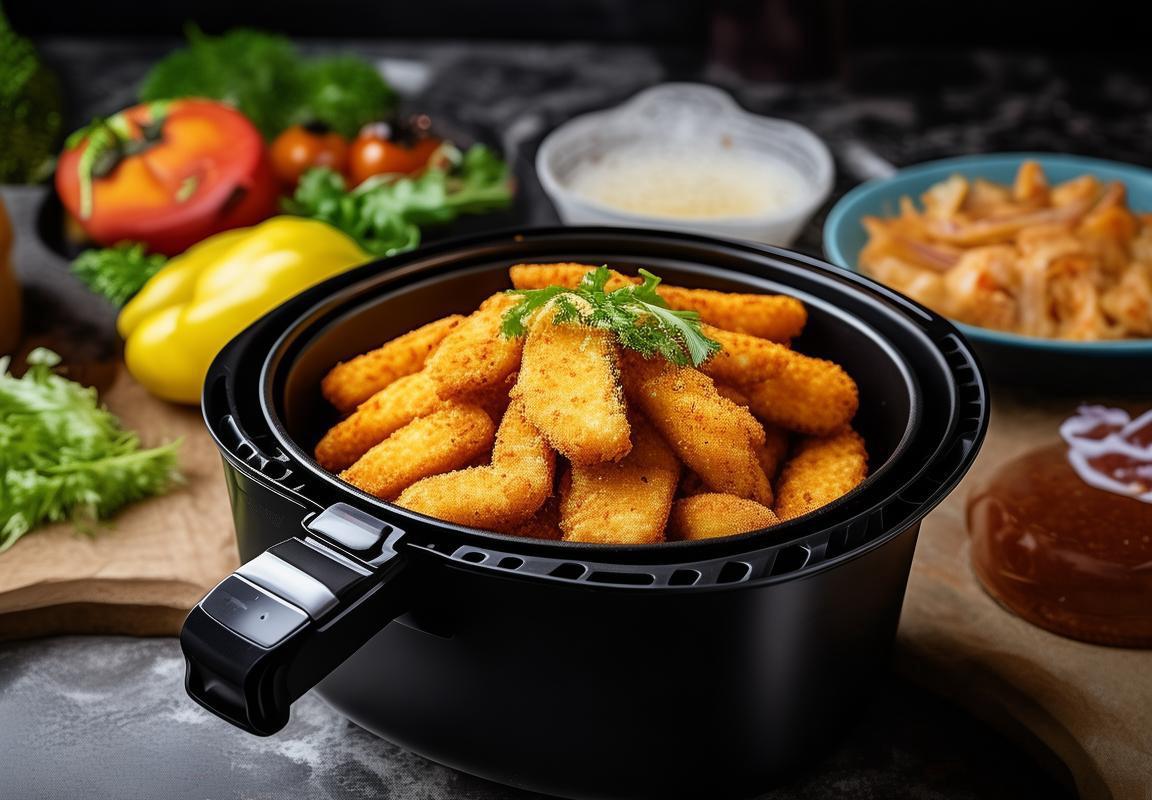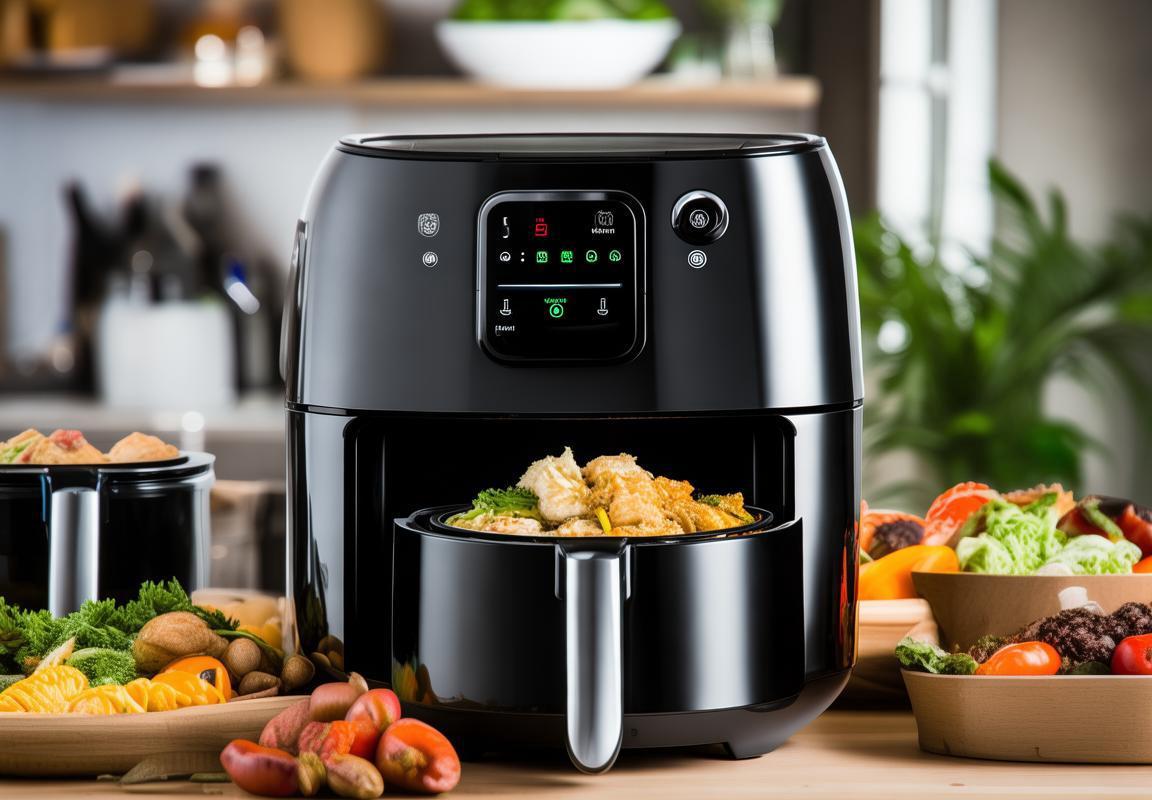As the global kitchen appliance market continues to evolve, the air fryer has emerged as a sought-after innovation. This compact cooking device has captured the hearts of consumers worldwide, offering a healthier alternative to traditional frying methods. With the increasing demand for these versatile appliances, it’s crucial for businesses to verify their suppliers to ensure quality, reliability, and a sustainable partnership. In this article, we delve into the key aspects of selecting a trustworthy air fryer supplier, focusing on factors such as product range, customization, pricing, warranty, and after-sales service. Through real-life case studies, we’ll highlight the success stories of businesses that have forged strong relationships with reputable suppliers, setting the stage for a thriving and mutually beneficial industry.
Introduction: The Rise of Air Fryers in the Global Market
The air fryer revolution has swept across the globe, transforming the way we cook and the way we think about healthy eating. These innovative kitchen appliances have managed to capture the hearts and kitchens of consumers worldwide, offering a guilt-free alternative to traditional frying methods. The global market for air fryers has seen exponential growth, and this article delves into the reasons behind this surge and the implications for both manufacturers and consumers.
Once a niche product, the air fryer has now become a staple in households across the United States, Europe, and beyond. Its popularity can be attributed to several key factors. Firstly, health-conscious consumers are gravitating towards cooking methods that reduce oil usage, thereby lowering the calorie count and fat content of their meals. Secondly, the convenience and efficiency of air frying have made it an attractive option for busy individuals and families looking to save time in the kitchen.
The technology behind the air fryer is also a significant draw. These devices use a combination of hot air and rapid circulation to cook food, creating a crispy outer layer while retaining the moisture and nutrients within. This process not only cuts down on oil but also reduces the cooking time compared to traditional frying methods. The result is a dish that tastes like deep-fried food without the adverse health effects.
Moreover, air fryers are incredibly versatile, capable of cooking a wide array of foods from vegetables and meats to even desserts. This flexibility has contributed to their widespread adoption, as consumers find that they can use their air fryers for everything from snacking to preparing full meals.
In the United States, air fryers have become particularly popular in the last few years, with sales skyrocketing during the pandemic. As people were spending more time at home and looking for healthier alternatives to fast food, the air fryer offered a solution that both desires. The market research company NPD Group reported that in 2020, air fryer sales in the U.S. increased by a staggering 73%, and this trend is expected to continue.
Europe has also seen a significant uptake in air fryer sales, with the UK, Germany, and France leading the charge. The region’s strong focus on health and wellness has made the air fryer an appealing product, especially as it aligns with the Mediterranean diet, which emphasizes cooking with minimal oil.
In Asia, the air fryer market is also growing, with Japan and South Korea being early adopters. The Asian market is particularly interested in air fryers that can also serve as rice cookers or multi-functional appliances, reflecting the region’s unique culinary needs and preferences.
The rise of the air fryer in the global market has had profound implications for the industry. Manufacturers have rushed to enter the market, with some offering innovative designs and features that differentiate their products from competitors. This competition has driven innovation and has led to a wider range of air fryer models, catering to various price points and consumer needs.
The increase in demand has also led to the development of new materials and manufacturing techniques, as manufacturers strive to produce air fryers that are both efficient and durable. The industry has seen advancements in heat distribution, fan technology, and user interfaces, making air fryers not only a healthier option but also a more user-friendly one.
In conclusion, the rise of the air fryer in the global market is a testament to the power of innovation and the consumer’s increasing focus on health and convenience. As the market continues to grow, we can expect to see further developments and enhancements to air fryer technology, making it an even more integral part of modern kitchens around the world.

Understanding the Importance of Verifying Suppliers
In today’s fast-paced global market, the importance of verifying suppliers cannot be overstated. The right supplier can mean the difference between a thriving business and a costly misstep. Let’s delve into why this process is so crucial.
-
Ensuring Product QualityThe quality of the products you sell is paramount to your brand reputation. A supplier that promises high-quality air fryers but fails to deliver can tarnish your brand. Verifying their credentials ensures that the products meet industry standards and consumer expectations.
-
Maintaining Supply Chain ReliabilityA reliable supplier guarantees a steady flow of products. Consistent deliveries are key to avoiding stockouts and keeping your customers satisfied. Verifying a supplier’s ability to meet your production demands is essential for a seamless business operation.
-
Adherence to Legal and Ethical StandardsIt’s not just about the product; it’s also about the way the product is made. Ensuring that your supplier adheres to legal and ethical practices is vital. This includes labor laws, environmental regulations, and fair trade practices, all of which are important for maintaining a positive public image.
-
Cost-Effectiveness and Budget ManagementWhile it’s tempting to go with the cheapest supplier, it’s often not the best choice in the long run. Verifying suppliers can help you find a balance between cost and quality. This way, you can manage your budget more effectively and ensure that your products are priced competitively.
-
Access to New Markets and TechnologiesThe global market is constantly evolving, and staying ahead requires access to new technologies and market insights. A verified supplier can introduce you to cutting-edge products and help you expand into new markets, providing a competitive edge.
-
Intellectual Property ProtectionYour product designs and branding are valuable assets. Verifying suppliers ensures that they have proper protocols in place to protect your intellectual property. This is particularly important in industries where innovation is key.
-
Language and Cultural BarriersWorking with suppliers from different countries can be challenging due to language and cultural differences. Verifying suppliers helps mitigate these issues by ensuring clear communication and a mutual understanding of business practices.
-
Long-Term Business RelationshipsBuilding strong relationships with suppliers can lead to long-term partnerships. These relationships often come with benefits such as preferential pricing, bulk order discounts, and quicker delivery times. Verifying suppliers is the first step in fostering such relationships.
-
Risk MitigationIn the global market, there are various risks, including currency fluctuations, trade policies, and supplier stability. Verifying suppliers helps you assess these risks and develop strategies to mitigate them, protecting your business from unforeseen challenges.
-
Brand Loyalty and Customer SatisfactionYour customers expect quality and reliability from the brands they trust. By verifying your suppliers, you’re not only ensuring the quality of your products but also building brand loyalty. Satisfied customers are more likely to return and recommend your brand to others.
-
Competitive PositioningIn a crowded market, standing out is crucial. Verifying suppliers allows you to maintain or improve the quality of your products, which can help you maintain a competitive edge over your rivals.
-
Global Supply Chain TrendsThe global supply chain is subject to constant change. By verifying suppliers, you stay informed about the latest trends and disruptions, enabling you to adapt quickly and maintain a robust supply chain.
In summary, verifying suppliers is an integral part of maintaining a successful business. It ensures product quality, supply chain reliability, ethical practices, cost-effectiveness, and much more. By taking the time to thoroughly vet your suppliers, you lay a solid foundation for your business’s growth and sustainability.

Researching the Supplier’s Reputation
In the bustling world of international trade, the reputation of a supplier can be the cornerstone of a successful business partnership. When it comes to sourcing air fryers, which have surged in popularity across the globe, understanding the supplier’s reputation is paramount. Here are several key aspects to consider:
-
Online Presence and Reviews: The digital age has made it easier than ever to gauge a supplier’s reputation. Start by examining their website for professionalism and content. Are they transparent about their products, services, and company history? Look for customer reviews on various e-commerce platforms and business directories. Pay attention to both the positive and negative feedback, as it can offer a balanced view of the supplier’s performance.
-
Industry Recognition: Awards and accolades can be a strong indicator of a supplier’s standing in the industry. Check if they have received any honors from trade associations or consumer organizations. These recognitions often reflect a commitment to quality, innovation, and customer satisfaction.
-
Testimonials and Case Studies: Genuine testimonials from past clients can provide valuable insights into the supplier’s reliability and customer service. Look for case studies that showcase successful collaborations and the outcomes achieved. These stories can help you understand how the supplier has contributed to the success of other businesses.
-
Social Media Engagement: Social media platforms are not just for marketing; they also serve as a window into a company’s culture and customer service. Monitor the supplier’s social media profiles for active engagement with customers, responsiveness to inquiries, and how they handle complaints. A supplier that is actively involved in social media is likely to be more accessible and customer-focused.
-
Media Mentions: A supplier with a good reputation is often featured in industry publications, news articles, or blogs. Look for mentions of the supplier in these outlets to get a sense of their visibility and credibility within the market.
-
Networking and Trade Shows: Networking with other industry professionals can provide insider information about suppliers. Attend trade shows and industry events where suppliers often showcase their products and services. Engaging with these suppliers face-to-face can give you a firsthand impression of their reputation and business practices.
-
Supplier Certifications: Certifications from recognized bodies such as ISO (International Organization for Standardization) or CE (Conformité Européenne) can assure you that the supplier adheres to stringent quality and safety standards. These certifications are a testament to the supplier’s commitment to excellence.
-
Supplier Network and Partnerships: A supplier with a strong network and partnerships may indicate a level of trust and respect within the industry. Research if they collaborate with other reputable brands or if they are part of larger supply chains that are known for quality.
-
Length of Operation: The longevity of a supplier in the market can be a good indicator of their stability and reliability. A supplier that has been in business for several years or even decades is likely to have a solid understanding of the market and customer needs.
-
Transparency and Communication: A supplier who is transparent about their business practices and maintains open lines of communication is often more trustworthy. Look for suppliers who provide clear information about their pricing, shipping, and return policies.
By thoroughly researching a supplier’s reputation through these various channels, you can make a more informed decision when selecting a partner for your air fryer supply needs. Remember, a strong reputation is not just about past performance; it’s also about the supplier’s ability to adapt and grow with the changing demands of the market.

Quality Assurance: Certification and Standards
Navigating the complexities of the global market for air fryers, it’s crucial to delve into the realm of quality assurance when selecting a supplier. Certifications and adherence to stringent standards are not just checkboxes; they are the cornerstones of a reliable partnership. Here’s a closer look at why these factors are vital:
In today’s interconnected world, the reputation of a supplier can travel fast. For air fryer manufacturers, ensuring that their suppliers meet high-quality standards is non-negotiable. One of the first steps in this process is to verify the certifications held by potential suppliers. These certifications are more than just pieces of paper; they are internationally recognized seals of approval that guarantee a certain level of quality and safety.
The ISO (International Organization for Standardization) is a globally recognized standard that sets out the criteria for quality management systems. When a supplier has ISO certification, it means they have undergone a thorough audit to ensure they meet these criteria. This can include everything from the efficiency of their production processes to the management of their environmental impact.
Similarly, the CE mark is a vital certification for products sold within the European Union. It signifies that a product complies with all the essential health, safety, and environmental protection requirements of EU legislation. For an air fryer manufacturer looking to enter the European market, a supplier with the CE mark is a must-have.
However, certifications are not just about meeting legal requirements. They are also a testament to a supplier’s commitment to excellence. A supplier that invests in obtaining certifications is likely to have a robust quality control system in place. This system can include regular inspections, employee training, and continuous improvement initiatives.
Beyond certifications, there are specific standards that apply to the air fryer industry. These include safety standards for electrical appliances, as well as standards for materials and components used in the manufacturing process. For instance, the use of BPA-free materials in air fryers is becoming increasingly important due to health concerns. A reputable supplier will not only use these materials but also ensure that they are certified as safe for use in kitchen appliances.
Another critical aspect is the standardization of components. A supplier that maintains a high level of standardization can offer consistency in quality and performance. This is particularly important for air fryers, where precise temperature control and even heating are key features that consumers expect.
When evaluating a supplier’s quality assurance, it’s also essential to consider their approach to product testing. A supplier that conducts rigorous in-house testing, as well as third-party testing, is more likely to deliver a high-quality product. These tests can range from simple function tests to more complex safety and durability tests.
The quality of packaging is another indicator of a supplier’s commitment to quality. A supplier that pays attention to the packaging of the air fryers not only ensures that the product arrives in perfect condition but also demonstrates an understanding of the importance of branding and customer satisfaction.
In addition to these tangible aspects, there’s also the matter of sustainability. A supplier that adheres to environmental standards and practices sustainable manufacturing processes is not only reducing their carbon footprint but also setting a positive example for the industry.
Ultimately, the choice of a supplier in the air fryer market is not just about finding someone who can provide the product at a competitive price. It’s about finding a partner who shares the same values and commitment to quality. Certifications and adherence to standards are not just about meeting legal requirements; they are about building trust and ensuring that the end product meets the highest expectations of both the manufacturer and the consumer.
In a market where the competition is fierce and the stakes are high, the supplier you choose can make or break your business. By thoroughly researching the certifications and standards a supplier upholds, you’re not just verifying their ability to deliver a quality product; you’re also ensuring that your brand maintains its integrity and reputation in the eyes of customers and industry peers.

Supply Chain Transparency
Understanding the complexities of the supply chain is crucial when sourcing products like air fryers. Here’s how to ensure transparency:
In the realm of global sourcing, transparency is a cornerstone of trust. It’s not just about knowing where your products come from but also understanding how they are made and the conditions under which they are produced. For air fryer suppliers, this means revealing every step of the manufacturing process, from raw materials to finished goods.
One of the most effective ways to gauge a supplier’s commitment to transparency is by examining their certifications. These documents aren’t just about meeting legal requirements; they’re a testament to a supplier’s adherence to certain standards and practices. Look for certifications like ISO (International Organization for Standardization), which covers a wide range of management systems, including quality, environmental management, and occupational health and safety.
Beyond certifications, suppliers should be able to provide detailed information about their sourcing practices. This includes the origins of their raw materials, the suppliers they work with, and the processes they use to ensure quality. For instance, if a supplier claims to use only sustainable and eco-friendly materials, they should be able to back up these claims with data and sourcing documentation.
Factory visits are another key indicator of a supplier’s willingness to be transparent. While it’s not always feasible for buyers to travel to distant factories, scheduling a virtual tour or requesting detailed photos and videos can offer insights into the production environment. These visuals should reveal a clean, organized, and efficient operation that prioritizes worker safety and well-being.
Communication is also a critical component of supply chain transparency. A reliable supplier should be open and honest about their processes, ready to answer any questions you might have. This includes discussing any potential risks or challenges they may face, such as fluctuations in raw material prices or disruptions in the supply chain.
Another aspect to consider is the supplier’s relationship with their workers. Transparency extends to the working conditions, wages, and benefits provided to employees. A supplier that is proud of its ethical practices will be more than willing to share information about its labor policies and how it ensures fair treatment for all workers.
Traceability is another important aspect of supply chain transparency. A good supplier should be able to trace the origin of their products back to the original suppliers of raw materials. This means that if there is ever a recall or issue with a batch of products, the supplier can quickly identify the source and take appropriate action.
Transparency also involves being upfront about pricing and costs. Suppliers should be clear about their pricing structure, including any hidden fees or additional costs. This transparency ensures that both parties are on the same page and helps to prevent misunderstandings or disputes later on.
Lastly, a supplier’s willingness to engage in continuous improvement is a sign of their commitment to transparency. They should be open to feedback and suggestions for enhancing their processes, whether it’s improving product quality, reducing waste, or adopting more sustainable practices.
In conclusion, supply chain transparency is not just about showing off a supplier’s practices but about building a solid foundation of trust. It requires openness, honesty, and a genuine desire to ensure that every step of the process is conducted with integrity and care. By scrutinizing certifications, examining sourcing practices, and fostering clear communication, buyers can rest assured that their air fryer suppliers are not just compliant with standards but are also committed to upholding them throughout the entire supply chain.

Product Range and Customization
Understanding the breadth and depth of a supplier’s product range is crucial for any business looking to enter the market with confidence. When it comes to air fryers, a diverse and adaptable range can be the difference between a successful venture and one that falls short. Let’s delve into what makes a supplier’s product range and customization capabilities stand out.
A wide array of models and sizes ensures that there’s an air fryer to suit every need, from the small, compact units perfect for single use or travel, to the large, family-sized appliances that can cater to a crowd. The variety should include different power outputs, allowing for users to choose based on their cooking preferences and the size of the meals they plan to prepare.
In today’s market, consumers are looking for more than just a device that cooks food. They want smart, connected appliances that offer convenience and efficiency. A supplier with a forward-thinking product range might offer models with features like digital displays, programmable settings, and even Bluetooth connectivity for remote monitoring and control.
Customization is also key. The ability to tailor products to specific market demands or client requirements is a testament to a supplier’s commitment to customer satisfaction. For instance, a supplier might offer air fryers with unique features such as adjustable temperature controls, various cooking modes (like crispy, health, or reheat), or even customizable cooking programs that can be set to cook a variety of dishes with ease.
Local regulations and preferences play a significant role in product customization. An experienced supplier will understand the importance of adhering to international safety standards and local electrical codes. They’ll also consider factors like power supply voltage, plug types, and even the design elements that resonate with consumers in different regions.
A supplier’s product range should also reflect their dedication to innovation and sustainability. This could mean incorporating eco-friendly materials, energy-efficient designs, or even offering a range of units that are designed to be easily recyclable at the end of their lifespan. Eco-conscious consumers are a growing segment, and a supplier that addresses these concerns can gain a competitive edge.
Moreover, the inclusion of accessories and add-ons can significantly enhance a product’s appeal. A supplier might offer accessories like recipe books, cooking baskets, and even air fryer lids that can transform the appliance into a multi-functional cooking tool. This type of thoughtfulness in product development can make a supplier’s offerings stand out in a crowded market.
In the realm of customization, suppliers often work closely with their clients to create bespoke solutions. This could involve anything from modifying the design of the air fryer to fit specific kitchen layouts to developing unique features that address niche market needs. For example, a supplier might collaborate with a restaurant chain to create a commercial-grade air fryer that is not only durable and efficient but also boasts a sleek design to match the restaurant’s branding.
The ability to offer a tailored product range also means that suppliers can cater to different price points. Whether it’s a budget-friendly model for the mass market or a premium, high-end unit for the luxury segment, a diverse range allows suppliers to reach a wider audience and capture more market share.
Lastly, a supplier’s commitment to ongoing product development is a clear indicator of their dedication to staying ahead of the curve. Regularly updating the product range with new features and technologies not only keeps the supplier relevant but also ensures that their clients can offer cutting-edge products to their customers.
In summary, a supplier’s product range and customization capabilities are multifaceted. It’s about offering a variety of options to meet different needs, incorporating innovative features, adhering to global and local standards, and providing solutions that are both sustainable and adaptable to market demands. A supplier that excels in these areas is not just a vendor; they’re a partner in success.

Pricing and Payment Terms
Navigating the complexities of pricing and payment terms with a Chinese air fryer supplier is crucial for a successful business transaction. Here’s a detailed look into what you should consider:
In today’s competitive market, securing the best possible pricing is a top priority. Suppliers may offer a variety of pricing models, each with its own set of benefits and drawbacks. Understanding these can help you make an informed decision.
-
Fixed Pricing: This is the most straightforward approach, where the supplier provides a set price for the air fryers. It’s ideal for businesses looking for predictability and stability in their costs. However, fixed pricing might not be flexible enough to accommodate market fluctuations or volume discounts.
-
Volume-Based Discounts: Suppliers often provide incentives for larger orders. These discounts can be a significant cost-saver, especially for businesses that plan to purchase in bulk. It’s important to negotiate these discounts upfront to ensure long-term savings.
-
Cost Plus Pricing: Some suppliers use a cost-plus pricing model, which means they add a percentage markup to the cost of production. This can be advantageous if you want to understand exactly what factors are influencing the price, but it can also be less competitive than other models.
-
Market-Based Pricing: This approach involves setting prices based on the current market rates. It can be beneficial for staying competitive, but it requires a keen understanding of market dynamics and the ability to react quickly to price changes.
Once you’ve determined the pricing model that works best for your business, the next step is to discuss payment terms. These can vary widely and include several key factors:
-
Payment Methods: Common methods include wire transfers, letters of credit, and credit cards. Each has its own level of security and convenience. For instance, letters of credit offer a layer of protection for both buyers and sellers, but they can also be more time-consuming to set up.
-
Down Payments: Many suppliers require a down payment to secure the order. This can range from 30% to 50% of the total cost, depending on the relationship between the buyer and the supplier. It’s important to understand the implications of making a significant upfront payment.
-
Installment Plans: Some suppliers offer installment plans, allowing you to make payments over time. This can be useful for managing cash flow, but it’s crucial to review the interest rates and fees associated with such plans.
-
Credit Terms: Credit terms refer to the number of days you have to pay after receiving the goods. For example, a 30-day credit term means you have 30 days from the invoice date to make the payment. Negotiating favorable credit terms can help improve your working capital.
-
Early Payment Discounts: To encourage prompt payment, some suppliers offer discounts for settling invoices early. This can be a good strategy to manage your cash flow effectively and potentially secure a better price for your products.
When it comes to pricing and payment terms, it’s also essential to consider the following:
-
Supplier’s Financial Stability: A supplier’s financial health can impact the reliability of their pricing and payment terms. Researching their financial statements or asking for references can provide insight into their stability.
-
Market Position: Suppliers with a strong market position may have more leverage in negotiations. Conversely, those with a more competitive stance might be more willing to negotiate terms.
-
Long-Term Relationships: Establishing a long-term relationship with a supplier can lead to more favorable pricing and payment terms. This is because suppliers are often more invested in maintaining a good relationship with a reliable customer.
-
Legal and Contractual Agreements: Always ensure that all pricing and payment terms are clearly documented and legally binding. This protects both parties in case of disputes or changes in circumstances.
In conclusion, the art of negotiation in pricing and payment terms with a Chinese air fryer supplier involves understanding different pricing models, selecting the appropriate payment methods, and considering the broader financial relationship with the supplier. By doing so, you can secure the best possible terms that align with your business goals and financial health.

Warranty and After-Sales Service
In today’s competitive marketplace, offering a solid warranty and exceptional after-sales service can be the difference between a customer who remains loyal and one who seeks alternative options. Ensuring that your customers feel supported long after the purchase is essential for building a reputable brand and fostering trust. Here’s a closer look at the critical aspects of warranty and after-sales service in the context of air fryer suppliers:
The Importance of a Comprehensive WarrantyCustomers are often wary of making significant purchases without a guarantee of quality and reliability. A robust warranty program reassures buyers that the product they invest in is backed by a commitment to its performance. For air fryer suppliers, a comprehensive warranty can cover various aspects, such as manufacturing defects, parts replacements, and even labor costs if the issue is within the warranty period.
Understanding Warranty TermsThe terms of a warranty are crucial. They outline the specific conditions under which the supplier will cover repairs or replacements. For air fryer suppliers, this could include the duration of the warranty, what is covered, and what is not. Clear, straightforward warranty terms help prevent misunderstandings and ensure that customers know exactly what to expect.
Responsive Customer SupportHaving a responsive customer support team is key to providing effective after-sales service. This includes handling inquiries, addressing concerns, and processing warranty claims promptly. For air fryer suppliers, this could mean a dedicated helpline, email support, or an online portal where customers can track their warranty claims.
The Role of Training in After-Sales ServiceThe quality of after-sales service can be heavily influenced by the training of the support staff. Suppliers should invest in training programs to ensure that their customer service representatives are well-versed in product knowledge and customer relations. This training helps in providing accurate information and efficient solutions to customer issues.
Regular Communication with CustomersMaintaining regular communication with customers post-purchase is essential. This can be done through newsletters, product updates, or follow-up calls. For air fryer suppliers, these communications can provide tips on using the product effectively, offer maintenance advice, and gather feedback on customer satisfaction.
Handling Warranty ClaimsWhen a warranty claim arises, the process should be smooth and straightforward. This involves assessing the issue, determining if it falls under the warranty terms, and then executing the necessary repairs or replacements. The speed and efficiency of this process can greatly impact customer satisfaction.
Feedback Mechanisms for Continuous ImprovementCreating a feedback mechanism allows suppliers to learn from their customers’ experiences and continuously improve their products and services. For air fryer suppliers, this could be through surveys, social media engagement, or direct feedback channels. Analyzing this feedback can lead to better product designs, improved warranty programs, and enhanced after-sales support.
Customizing Support for Different MarketsIt’s important for suppliers to recognize that customer expectations can vary by market. Therefore, customizing the after-sales service to align with local regulations, cultural preferences, and customer behaviors is essential. This might mean translating support materials into local languages or adjusting service hours to accommodate different time zones.
Building a Reputation for Excellent Customer CareUltimately, the goal of a comprehensive warranty and after-sales service is to build a reputation for excellent customer care. When customers know that a supplier stands behind its products and is committed to their satisfaction, it can lead to higher customer retention rates and positive word-of-mouth referrals.
In conclusion, the warranty and after-sales service offered by air fryer suppliers play a significant role in customer loyalty and brand reputation. By providing a comprehensive warranty, responsive customer support, and a commitment to continuous improvement, suppliers can ensure that their customers feel valued and cared for long after the purchase is made.

Case Studies: Success Stories with Reputable Suppliers
In the competitive world of kitchen appliances, partnering with a reputable supplier can make all the difference. Let’s delve into some success stories that highlight the benefits of working with trusted suppliers in the industry.
A small startup, FreshBake, was looking to expand its product line and needed a reliable supplier for its air fryer models. After thorough research, they found a supplier with an impressive track record of delivering high-quality products. The supplier’s commitment to excellence paid off for FreshBake, as their sales soared, and customer satisfaction remained consistently high.
One notable success story involves Global Gourmet, a well-established brand that sought to diversify its product offerings. They partnered with a supplier known for its innovative designs and cutting-edge technology. The collaboration resulted in the launch of a new line of air fryers that quickly became a hit among consumers, significantly boosting Global Gourmet’s market share.
Another example is that of EasyCook, a company specializing in eco-friendly kitchen appliances. They were on the hunt for a supplier that shared their values and could provide sustainable solutions. Their search led them to a supplier with a strong environmental policy and a commitment to sourcing materials responsibly. The partnership allowed EasyCook to introduce a line of air fryers made from recycled materials, which resonated with environmentally conscious consumers and bolstered their brand reputation.
In the case of SmartChef, a brand focused on smart technology integration, finding the right supplier was crucial. They collaborated with a supplier that not only offered advanced features but also ensured compatibility with various smart home systems. This strategic partnership allowed SmartChef to launch a range of air fryers that could be controlled via smartphone apps, making them a favorite among tech-savvy consumers.
These success stories illustrate the importance of selecting the right supplier for your business. A reputable supplier can help you achieve the following:
-
Enhanced Product Quality: Working with a trusted supplier ensures that your products meet the highest standards of quality and safety, which is essential for building customer trust and loyalty.
-
Competitive Pricing: Suppliers with efficient operations and strong relationships with manufacturers can offer competitive pricing, helping you maintain profitability and offer competitive prices to your customers.
-
Quick Turnaround Times: A reliable supplier can provide timely delivery, ensuring that you can meet customer demand without delays.
-
Customization and Innovation: Partnering with a supplier that values innovation can open doors to creating unique products that stand out in the market.
-
Long-Term Partnerships: Building a strong relationship with a supplier can lead to long-term partnerships, which can offer benefits such as preferential treatment, exclusive product lines, and ongoing support.
-
Market Trends and Insights: Suppliers who are well-versed in the industry can provide valuable insights into market trends and customer preferences, helping you stay ahead of the competition.
-
Reduced Risks: A reputable supplier minimizes the risks associated with quality control, intellectual property, and supply chain disruptions.
In conclusion, the right supplier can be a game-changer for your business. Success stories like those of FreshBake, Global Gourmet, EasyCook, and SmartChef demonstrate how a strong partnership can lead to increased sales, enhanced brand reputation, and a competitive edge in the market. Whether it’s through enhanced product quality, competitive pricing, or a commitment to innovation, choosing the right supplier is a strategic decision that can yield significant benefits for your business.

Conclusion: Ensuring a Win-Win Business Relationship
In the competitive landscape of international trade, establishing a win-win business relationship is paramount. It’s not just about sealing a deal but about building a partnership that thrives on mutual respect, trust, and long-term success. Here are some key considerations to ensure that both parties benefit from their association.
When considering a supplier, it’s crucial to evaluate their commitment to quality, their understanding of market trends, and their adaptability to your specific business needs. One way to gauge this is through case studies that showcase successful collaborations. These stories can provide valuable insights into how reputable suppliers have navigated challenges and delivered exceptional results.
For instance, one such success story involves a small startup that sought to enter the European market with a line of eco-friendly kitchen appliances. They partnered with a supplier known for its innovative products and sustainable practices. The supplier not only provided the startup with a custom product range but also offered valuable market insights, helping the startup to tailor its marketing strategy to the European consumer.
Another case study highlights a global kitchenware brand that needed to expand its product line to cater to the rising demand for air fryers. They turned to a supplier with a strong reputation for quality and reliability. The supplier not only delivered a high-quality product but also helped the brand to optimize its supply chain, reducing costs and improving delivery times.
These success stories underscore the importance of a supplier’s ability to understand and meet your unique business requirements. A reputable supplier will not only provide the products you need but also offer support in areas such as market research, product design, and distribution.
One of the hallmarks of a successful business relationship is the level of trust that exists between the supplier and the client. This trust is often built through transparency and open communication. Suppliers who are transparent about their manufacturing processes, sourcing practices, and pricing structures are more likely to be reliable partners.
Case studies often reveal how suppliers have gone the extra mile to ensure their clients’ success. For example, a supplier may proactively communicate changes in the supply chain or market conditions, allowing the client to make informed decisions and mitigate risks.
Another aspect of a win-win relationship is the willingness of both parties to adapt to changes. The global market is dynamic, and a supplier who is flexible and responsive to these changes can be a significant asset. This adaptability is particularly important when it comes to technology and innovation, as the kitchen appliances industry is constantly evolving.
When evaluating a supplier, it’s also essential to consider their approach to customer service and after-sales support. A reputable supplier will have a robust system in place to handle inquiries, issues, and warranty claims promptly and efficiently. This level of service ensures that any potential problems are addressed swiftly, minimizing any negative impact on the client’s business.
Another case study involves a client who was facing a shortage of parts due to a supplier’s delay. The supplier, recognizing the urgency, expedited the shipment and provided alternative solutions to keep the client’s production line running smoothly. This proactive approach not only saved the client time and money but also reinforced the trust between the two parties.
In conclusion, the key to a win-win business relationship lies in a combination of factors. A supplier must offer high-quality products, be transparent in their operations, adaptable to market changes, and provide exceptional customer service. By collaborating with a reputable supplier, businesses can focus on growing their operations and expanding into new markets with confidence.
The case studies of successful collaborations demonstrate that when both parties are committed to achieving mutual success, the results can be profound. It’s not just about the products or services exchanged; it’s about the entire experience, from the initial negotiation to ongoing support and beyond. By choosing the right supplier, businesses can ensure that their partnerships are built on a foundation of trust, respect, and shared goals.